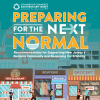Quick Links
On February 19, Chamber of Commerce Southern New Jersey (CCSNJ) Director of Government Affairs Hilary Chebra was invited to testify at the inaugural meeting of the Assembly Health Infrastructure Committee.
The following is an op-ed by CCSNJ President & CEO Christina Renna, published today in BINJE: “South Jersey’s rural hospitals are an economic lifeline – they must not be left behind”
On February 5, the Senate Labor Committee was scheduled to consider S-2136 (Moriarty), legislation that would impose new requirements on employers related to job postings and various stages of the hiring process.
During her inaugural speech, Governor Mikie Sherrill signed two Executive Orders (EO) to declare a State of Emergency on Utility Costs.
On January 17, Governor Murphy signed S-2950/A-3451 (Moriarty/Zwicker/Quijano/Reynolds-Jackson/Coughlin), which expands job-protected paid family leave to employers with 15 or more employees. Currently, for an employee to be eligible for NJFLA job-protected leave, the employee must work for an employer with 30 or more employees, have been employed for at least 12 months, and have worked 1,000 hours in the last 12 months.
On January 13, CCSNJ attended the 222nd legislative reorganization. Twelve new Assemblymembers were sworn in, including two new members from South Jersey. Democrats now hold a majority of 57-23.
On January 13, CCSNJ attended Governor Murphy’s final State of the State address, during which he reflected on eight years of governing under the theme of building a “stronger and fairer” New Jersey. The Governor emphasized that his administration sought to balance economic growth with fairness for working families, pointing to what he described as a period of strong economic performance paired with long-term fiscal stability.
On January 12, the New Jersey General Assembly passed S-2950/A-3451 (Moriarty/Zwicker/Quijano/Reynolds-Jackson/Coughlin), which would expand job-protected paid family leave to employers with 15 or more employees. Under current law, these requirements apply only to businesses with 30 or more employees. If signed into law, the bill would extend coverage under the state’s Family Leave Act (FLA) to a new group of very small businesses.
On January 8, CCSNJ Director of Government Affairs Hilary Chebra testified before the Senate Budget and Appropriations Committee in opposition to S3545, the “Climate Superfund Bill.” In her testimony, Ms. Chebra raised concerns about the bill’s potential impact on South Jersey, a region that is home to one of New Jersey’s two remaining refineries.
Governor-elect Mikie Sherrill has announced several key cabinet and senior staff appointments ahead of her inauguration on January 20, outlining the leadership team that will guide her administration.
On January 5, Governor Phil Murphy signed into law A5728/S4485, establishing the New Jersey Innovation Authority (NJIA). The legislation codifies the New Jersey State Office of Innovation (OOI) as an Authority within the Department of the Treasury.
Several state-mandated changes will take effect on January 1 that may impact business operating costs and household expenses across New Jersey.
On December 12, the Senate Budget and Appropriations Committee considered S-2950/A-3451 (Moriarty/Zwicker/Quijano/Reynolds-Jackson/Coughlin), which would gradually lower the employer-size threshold for coverage under New Jersey’s Family Leave Act (FLA). As amended, the bill would apply to employers with 15 or more employees. Earlier versions of the legislation proposed expanding coverage to businesses with as few as five employees.
On December 1, two bills that would impact New Jersey businesses, previously scheduled for consideration in the Senate Labor Committee, were pulled from the agenda.
On November 26, Governor-elect Mikie Sherrill announced the launch of the third component of her transition’s policy process: an Interdisciplinary Task Force that brings together leaders from across New Jersey, including representatives from labor, business, veterans’ organizations, environmental groups, healthcare, education, and more.
On November 25, Governor-elect Mikie Sherrill announced the launch of a statewide public input survey, inviting every New Jerseyan to share their ideas, concerns, and priorities as she continues to build her incoming administration.
On November 21, Governor-elect Mikie Sherrill announced the first phase of the Transition Committee’s process comprised of ten Action Teams to be led by statewide and national experts.
On November 4, New Jersey held elections for all 80 seats in the New Jersey General Assembly, as well as the Office of the Governor.
The Chamber of Commerce Southern New Jersey (CCSNJ) was proud to host both candidates for Governor weeks before the election at its Gubernatorial Candidates Forum on October 10 at Resorts Casino Hotel in Atlantic City.
The Chamber of Commerce Southern New Jersey (CCSNJ) was among the invited guests to testify before the Senate State Government, Wagering, Tourism & Historic Preservation Committee on October 6 to discuss the economic impact of tourism and agritourism in the region.
On September 3, CCSNJ President and CEO Christina Renna was invited to attend a summit on the current economic landscape of the City of Camden with Governor Phil Murphy and New Jersey Economic Development Authority CEO Tim Sullivan, as well as other business, community and faith-based leaders, the mayor, state legislators and stakeholders.
On September 3, Governor Phil Murphy announced the launch of the Office of Strategic Defense Investment, which will champion New Jersey’s defense industry by attracting new missions, safeguarding the competitiveness and sustainability of the state’s existing defense infrastructure, and fostering industry growth.
On Wednesday, August 20, the Chamber of Commerce Southern New Jersey (CCSNJ) hosted Governor Phil Murphy at an event featuring a fireside chat with Tom Bergeron, Founder, CEO and Editor-in-Chief of BINJE. The event, which was attended by approximately 150 CCSNJ members, was focused on the Governor’s tenure in office and how his Administration has aided the region over the past eight years.During the event, Governor Murphy made a major announcement, which directly aligned with CCSNJ’s advocacy measures over recent months
On Wednesday, August 13, Chamber of Commerce Southern New Jersey (CCSNJ) President & CEO Christina Renna joined Governor Phil Murphy as his guest at the signing of A5687/S4407(Greenwald/McClellan/Reynolds-Jackson/Testa/Greenstein).
On Monday, June 30, the New Jersey Senate and General Assembly approved the Fiscal Year 2026 state budget by votes of 26-13 and 52-27-1, respectively. Governor Phil Murphy signed the budget into law just before midnight, meeting the constitutional deadline and avoiding a state government shutdown.
On Monday, June 23, Chamber of Commerce Southern New Jersey (CCSNJ) Director of Government Affairs Hilary Chebra provided testimony to the New Jersey Department of Labor and Workforce Development (NJDOL) on changes to N.J.A.C. 12:11—aimed at clarifying the ABC test for worker classification. New Jersey uses the ABC test to determine whether a worker is an independent contractor or an employee under its wage and hour laws.
The following is an op-ed by CCSNJ President & CEO Christina Renna, published today in BINJE: “Why South Jersey Deserves a Dedicated Share of Its Corporate Transit Fee Contributions”
On June 10, New Jersey voters took to the polls to select party nominees in the 2025 primary elections for all 80 seats in the General Assembly and to determine the Democratic and Republican nominees for Governor.
The Chamber of Commerce Southern New Jersey (CCSNJ) expressed serious concerns over Senate Bill 3398 and Assembly Bill 5009, the “Packaging Product Stewardship Act,” which seeks to implement an Extended Producer Responsibility (EPR) program for packaging materials.
On Thursday, April 10, the Chamber of Commerce Southern New Jersey (CCSNJ) testified before the Assembly State and Local Government Committee on two proposed bills with significant implications on the small business community
On Wednesday, March 26 the Chamber of Commerce Southern New Jersey(CCSNJ) testified at the Senate Budget Appropriations Committee, the last of two public hearings on the FY2026 State Budget as proposed by Governor Phil Murphy.
On Tuesday, March 19 the Chamber of Commerce Southern New Jersey(CCSNJ) testified at the Assembly Budget Committee, the first of two public hearings on the FY2026 State Budget as proposed by Governor Phil Murphy.
The Chamber of Commerce Southern New Jersey joined Circulate NJ, a coalition dedicated to advancing the Transportation, Logistics, and Distribution (TLD) industries—including port workers, warehouses, retail developers, trucking companies, and more.
On Tuesday, February 26, the Chamber of Commerce Southern New Jersey (CCSNJ) attended Governor Phil Murphy’s Fiscal Year 2026 Budget Address as an invited guest.
On Friday, February 21, Governor Phil Murphy announced the members of the newly established New Jersey Economic Council. Chamber of Commerce Southern New Jersey (CCSNJ) President and CEO Christina Renna was honored to be named as a public appointee to the Council and is the only member of the Council representing the South Jersey region.
Op-ed: Turning Disappointment into Opportunity at the N.J. Wind Port
By Christina Renna, President & CEO, CCSNJ
On Tuesday, January 14, the Chamber of Commerce Southern New Jersey (CCSNJ) attended as an invited guest of Governor Phil Murphy for his annual State of the State Address, where he outlined his plans for his final year in office.
As we reflect on 2024, the Chamber of Commerce Southern New Jersey (CCSNJ) remains committed to advocating for policies that support regional economic competitiveness and job growth. This year has seen significant legislative developments and the CCSNJ has actively engaged on multiple important policy issues that represent the needs of our members, as well as the strength of South Jersey.
On December 16, Chamber of Commerce Southern New Jersey (CCSNJ) Manager of Government Affairs Hilary Chebra was invited to deliver testimony before the Senate Law and Public Safety Committee on the increasing cybersecurity threats facing the business community.
On December 2, the New Jersey Department of the Treasury announced a 2.6-cent-per-gallon increase to the state gas tax starting January 1, 2025. This adjustment follows the 2024 legislation (Chapter 7) which raises the State's Highway Fuel Cap incrementally from Fiscal Year 2025 to Fiscal Year 2029.
On October 24, the Chamber of Commerce Southern New Jersey (CCSNJ) was invited to present testimony before a joint hearing of the Senate State Government, Wagering, Tourism & Historic Preservation Committee and the Assembly Tourism, Gaming and the Arts Committee on the topic of online sports betting and its impact on the State. The CCSNJ thanks Chairman Jim Beach and Chairman Bill Moen for the invitation to participate.
On June 28, Governor Murphy signed the $56.6 billion FY2025 budget, the largest in state history.
On June 27, Chamber of Commerce Southern New Jersey (CCSNJ) Manager of Government Affairs, Hilary Chebra testified before the Assembly Budget Committee and Senate Budget and Appropriations Committee on the FY2025 state budget and the proposed Corporate Transit Fee.
On June 4, New Jersey held primary elections for the U.S. Senate and all 12 of New Jersey’s seats in the U.S. House of Representatives.
On Monday, May 20 the Chamber of Commerce Southern New Jersey (CCSNJ) provided comments at the first of four public hearings on the 2024 New Jersey Energy Master Plan (“EMP”).
In two separate hearings, the Chamber of Commerce Southern New Jersey (CCSNJ) was an invited guest to discuss the findings of the New Jersey Disparity Study, which was released earlier this year.
On, Tuesday, April 23 the Chamber of Commerce Southern New Jersey (CCSNJ) was an invited speaker at a press conference on Governor Murphy’s proposed 2.5 percent Corporate Transit Fee in the FY2025 state budget. The press conference was arranged and hosted by the New Jersey Business Coalition, which the CCSNJ is a part of and is led by the New Jersey Business & Industry Association.
Since the COVID-19 pandemic, New Jersey has been flush with cash – a rarity in New Jersey – and the current Administration has been fast to increase state spending over recent years. Case in point, the FY2025 state budget is a $55.9 billion proposal, which is a 61 percent increase in state spending since 2018.
On Tuesday, March 19 and Wednesday, March 20 the Chamber of Commerce Southern New Jersey (CCSNJ) provided comments at two public hearings on the FY2025 state budget, as proposed by Governor Phil Murphy. The Senate hearing took place at the New Jersey Institute of Technology (NJIT) in Newark and the Assembly hearing took place in Trenton, during which Budget Committee members heard comments from the public on the budget proposal and provided suggestions on how it can be improved.
The Chamber of Commerce Southern New Jersey (CCSNJ) is proud to have obtained widespread bipartisan support from policymakers, economic development, labor and higher education leaders on its recent policy report entitled, “Long Story Short: South Jersey - A Busy Policymaker’s Guide to Understanding a Misunderstood Region.” See below to see what they are saying.
On Monday, March 18 both Houses of the Legislature sent the Transportation Trust Fund reauthorization legislation, A-4011 (Calabrese/Wimberly)/S-2931 (Sarlo/Scutari) to the Governor’s desk for action. Below please find Christina M. Renna, President & CEO of the Chamber of Commerce Southern New Jersey (CCSNJ) statement on the measure:
On Thursday, March 7 the Assembly Transportation and Independent Authorities Committee will consider A-4011 (Calabrese), which revises the Transportation Trust Fund (TTF) for a five-year period, as well as the gas tax rate, and establishes an annual fee for electric vehicles (EVs).
On Monday, March 11 the Senate Budget & Appropriations Committee considered S-2931 (Sarlo/Scutari), which would renew the New Jersey Transportation Trust Fund Authority Act for a five-year period and increase the gas tax.
On February 27, Governor Phil Murphy delivered the FY2025 state budget to a joint session of the New Jersey Legislature. The Chamber of Commerce Southern New Jersey (CCSNJ) was in attendance during the address, which outlined his $55.9 billion proposal.
After the conclusion of the FY2025 state budget address, the New Jersey Department of Treasury released the Budget in Brief (BIB), which provides a summary of the recommendations in Governor Murphy’s budget proposal. The BIB can be found here.
On Monday, February 12 the Chamber of Commerce Southern New Jersey (CCSNJ) released its latest policy report entitled, Long Story Short: South Jersey - A Busy Policymakers Guide to Understanding a Misunderstood Region.
On Thursday, February 1 the Chamber of Commerce Southern New Jersey (CCSNJ) was invited to provide testimony on the state of the tourism industry during the Assembly Tourism, Gaming & the Arts Committee in Trenton.
On January 25, the Chamber of Commerce Southern New Jersey (CCSNJ) opposed S-1386 (Singleton), which would regulate the types of benefits employers provide independent contractors and freelance workers.
On Tuesday, January 23, the state released its long-awaited Disparity Study, which examined the awarding of government contracts for Minority and Women-Owned (MWBE) businesses. The results of the study, which aims to determine if certain ethnic and gender groups get a proportionate amount of government contracts, appears to be far worse than expected showing minority groups have lost billions in potential government contracts.
On June 6, New Jersey held primary elections for several state, county, and local races.
As of June 1, 2023, working papers for minors have gone digital. The website, MyWorkingPapers.nj.gov, is now live.
On Thursday, May 18 the Chamber of Commerce Southern New Jersey (CCSNJ) president & CEO, Christina Renna participated in a major announcement from the New Jersey Department of Labor & Workforce Development (NJDOL) on how working papers are filed for underage workers.
On May 18, Chamber of Commerce Southern New Jersey (CCSNJ) Manager of Government Affairs, Hilary Chebra, provided testimony before the Assembly Commerce and Economic Development Committee and the Assembly Appropriations Committee on A-4694 (Tully/Swain).
On May 8, Hilary Chebra, Manager of Government Affairs provided testimony on several bills before the Senate Labor Committee.
On May 1, Hilary Chebra, Manager of Government Affairs testified at a Joint Legislative Special Meeting on Higher Education held by the Senate Higher Education Committee and Assembly Higher Education Committee. The CCSNJ was asked to participate to discuss the Chamber’s collaboration with community colleges in the area of workforce development.
The official version of the adopted the Environmental Justice Rules was published in the New Jersey Register on April 17, 2023.
On February 28, the CCSNJ attended Governor Murphy’s FY2024 State Budget Address. The Governor proposed a $53.1 billion budget, the largest in state history, which includes a proposed surplus of $10 billion.
On Thursday, February 16, the Chamber of Commerce Southern New Jersey’s (CCSNJ) Manager of Government Affairs, Hilary Chebra testified before the Assembly Science, Innovation and Technology Committee on a package of bills aimed at growing the innovation economy in New Jersey
On Wednesday, February 15, Governor Phil Murphy signed three Executive Orders that set new clean energy goals. These Executive Orders include an accelerated target of 100 percent clean energy by 2035 – 15 years sooner than the initial goal of 100 percent clean energy by 2050, a goal of installing zero-carbon-emission heating and cooling systems by 2030, and a ban on the sale of gasoline-fueled vehicles by 2035.
On Thursday, January 26, the Chamber of Commerce Southern New Jersey’s Manager of Government Affairs, Hilary Chebra testified before the Senate Economic Growth Committee on a package of bills aimed at assisting small businesses.
On January 26, the U.S. Secretary of Commerce Gina Raimondo announced that the Department’s Economic Development Administration (EDA) is awarding a $1.1 million grant to North Wildwood for reconstruction of three blocks of boardwalk space.
On Friday, January 20, Governor Murphy announced plans for a new Energy Master Plan (EMP), which is to be released in 2024.
Election Day 2022 proved to be uneventful on the Congressional level for the South Jersey but saw big changes to certain county government compositions.
On June 30, Governor Murphy signed the FY2023 State Budget. Although the final $50.6 billion FY2023 budget is the largest in state history with no new taxes, it included minimal assistance to the state’s business community.
On June 29, the New Jersey Senate and General Assembly held their final voting sessions before the Legislature’s summer recess. A bill that would provide relief from UI tax increases for small businesses, which the CCSNJ has strongly advocated for, was removed from the Senate agenda and will not move to the Governor's desk for action.
On June 27, the New Jersey Senate Budget and Appropriations Committee and the Assembly Budget Committee voted on the final $50.6 billion FY2023 budget.
On June 22, Governor Phil Murphy, Senate President Nicholas Scutari and Assembly Speaker Craig Coughlin announced a ten day back-to-school sales tax holiday as a part of the Fiscal Year 2023 Budget.
On June 16, FIFA announced the selection of the New York City and New Jersey as a joint host for matches at MetLife Stadium in East Rutherford during the 2026 FIFA World Cup.
On June 13, Chamber of Commerce Southern New Jersey's (CCSNJ) Manager of Government Affairs, Hilary Chebra, was invited to testify before a Joint Committee meeting of the Assembly Commerce and Economic Development Committee and the Assembly Women and Children's Committee on the decline of women in the workforce since the start of the pandemic, as well as the importance of affordable and accessible childcare to narrow the gender gap in labor force participation.
On June 13, the Assembly Appropriations Committee considered A-3683/A-2152 (Freiman/Greenwald/Chaparro/Dancer), which if passed would stop the pending Unemployment Insurance (UI) tax increases on businesses.
On May 3, Governor Phil Murphy signed Executive Order No. 295 instructing the New Jersey Department of the Treasury to establish a State-backed certification program for LGBTQ+-owned businesses.
On March 29, Chamber of Commerce Southern New Jersey's (CCSNJ) Manager of Government Affairs, Hilary Chebra, testified before the Senate Budget and Appropriations Committee on the Governor's proposed $48.9 billion FY2023 Budget that is now under consideration by the Legislature and must be finalized by the June 30 deadline.
On March 25, Chamber of Commerce Southern New Jersey's (CCSNJ) Manager of Government Affairs, Hilary Chebra, provided comments at the New Jersey Board of Public Utilities (NJBPU) Stakeholder Meeting on the Energy Master Plan’s (EMP) Ratepayer Impact Study.
On March 21, Chamber of Commerce Southern New Jersey's (CCSNJ) Manager of Government Affairs, Hilary Chebra, testified before the Assembly Budget Committee. The CCSNJ was the only South Jersey business organization to weigh in on the Governor's proposed $48.9 billion FY2023 Budget that is now under consideration by the Legislature and must be finalized by the June 30 deadline.
Governor Phil Murphy signed the New Jersey Secure Choice Act (P.L. 2019 c. 56) in March of 2019, authorizing the creation of the Secure Choice Savings Program. The CCSNJ opposed the creation of this program, which requires businesses with 25 or more employees that do not offer a qualified retirement plan, to implement a payroll deduction retirement plan for employees. Employers can either participate in the state-run plan or offer employees an alternative qualified retirement savings option such as a 403(b) or 401(k) re
On March 8, Governor Murphy delivered the FY2023 State Budget address. The public health emergency was lifted on March 7 allowing Governor Murphy to deliver the address in-person in the Assembly chambers for the first time in two years, which the CCSNJ attended.
On January 18, Governor Murphy was sworn into his second term as Governor, becoming the first Democratic New Jersey governor to be re-elected since 1977.
On January 18, Governor Murphy today signed the following bills that the Chamber of Commerce Southern New Jersey supported...
On January 13, the U.S. Supreme Court blocked the Biden Administration from enforcing a vaccine-or-testing mandate for businesses with at least 100 employees. However, the court is allowing the Administration to proceed with a vaccine mandate for most healthcare workers at facilities receiving federal money to be vaccinated.
On January 11, Governor Phil Murphy delivered the State of the State Address, which was held virtually due to the recent rise in COVID-19 cases.
On January 11, Governor Murphy reinstated a Public Health Emergency, effective immediately. Executive Order No. 280 declares a Public Health Emergency and restates the existing State of Emergency across all 21 counties in New Jersey.
On Wednesday, December 22 the New Jersey Congressional Redistricting Commission selected the next congressional map, which outlines how congressional voting districts will change based on federal data from the U.S. Census.
In September, President Biden announced a sweeping and vague federal vaccine mandate for employers with 100 or more employees ordering the Occupational Safety and Health Administration (OSHA) to issue regulations on requirements and enforcement. In November, OSHA issued their emergency temporary standard (ETS) for employers, which was quickly halted by several lawsuits brought by various states.
On January 1, 2022, New Jersey’s minimum wage rate will increase to $13 per hour for most employers. This increase, which was statutorily set to rise annually, will continue to do so on the first of the year until reaching $15 per hour in 2024.
On November 30, the Joint Budget Oversight Committee (JBOC) approved $700 million in American Rescue Plan Act (ARP) and New Jersey Debt Defeasance and Prevention Fund spending, as proposed by Governor Murphy.
On November 15, President Biden signed the the $1.2 trillion bipartisan Infrastructure Investment and Jobs Act.
On November 5, the Occupational Safety and Health Administration (OSHA) published in the Federal Register its emergency temporary standard (ETS) that will require private sector employers with 100 or more workers to ensure that employees are vaccinated against Covid-19. If employers do not want to dismiss employees who are not vaccinated, they have the option to allow those unvaccinated employees to submit a weekly negative COVID test and follow masking requirements when working indoors
On November 8, Governor Murphy acted on a number of bills that were sent to his desk prior to the break for the election. The Governor signed into law the following bills supported by the CCSNJ
On November 4, President Biden announced the Department of Labor’s Occupational Safety and Health Administration (OSHA) is issuing a COVID-19 Vaccination and Testing Emergency Temporary Standard (ETS) to require employers with 100 or more employees require vaccination by January 4th, 2022 and require unvaccinated employees to produce a negative test on at least a weekly basis. Companies that fail to comply with the rule may be subject to fines.
The following Op-ed by Chamber of Commerce Southern New Jersey President and CEO Christina Renna and Garden State Initiative President Regina Egea was published in the Press of Atlantic City
On November 2, New Jersey held elections for all 120 seats in the New Jersey Legislature, as well as for Governor, resulting in unexpected outcomes across the state, with many results too close to call on election night.
On October 13, Governor Phil Murphy announced his administration will utilize more than $700 million of American Rescue Plan funding allocated to Human Services to help parents pay for child care, provide bonus pay to child care workers, and distribute grants and increase support for child care providers.
On September 27, Governor Murphy announced the New Jersey Department of Labor and Workforce Development (DOLWD) will be launching the Return and Earn Program. Employers may receive up to $10,000 in wage subsidies to hire and train new employees for up to six months. The wage subsidy will cover 50 percent of wages for up to six months for new employees. The subsidy is capped at $10,000 per new employee and at $40,000 per employer.
On September 22, New Jersey of Environmental Protection (NJDEP) Commissioner Shawn LaTourette issued an Administrative Order (AO 2021-25) to clarify the Department’s permit application assessment for facilities located or sought to be located in overburdened communities while working to promulgate the regulations necessary to implement the Environmental Justice Law, N.J.S.A. 13:1D-157.
On September 17, Governor Phil Murphy signed Executive Order No. 263, which provides for the expiration of extensions of Department of Environmental Protection rulemaking deadlines that were instituted in Executive Order No. 127 (2020) due to the COVID-19 pandemic.
On September 10, President Biden announced a new six-point plan to continue to combat COVID-19. As part of this plan, the Department of Labor’s Occupational Safety and Health Administration (OSHA) is developing a rule that will require all employers with 100 or more employees to ensure their workforce is fully vaccinated or require any workers who remain unvaccinated to produce a negative test result on at least a weekly basis before coming to work.
On September 9, the CCSNJ was proud to join Governor Phil Murphy, U.S. Secretary of Labor Marty Walsh, Senate President Stephen Sweeney, Assembly Speaker Craig Coughlin and other elected officials, business and union leaders, environmental advocates and representatives of the offshore wind industry for the groundbreaking of the New Jersey Wind Port, the nation’s first purpose-built offshore wind marshaling port.
On September 8, the New Jersey Economic Development Authority (NJEDA) announced the approval of the Henri/Ida Business Assistance Grant Program at a special meeting of its Board held earlier today. The $10.5 million program will provide grants of $1,000 to $5,000 for businesses and non-profits that suffered physical damage from the effects of recent tropical storms Henri and Ida. The NJEDA expects to launch an online application for the program at 9:00 a.m. on Friday, September 17 at https://www.njeda.com/henri-ida-reli
On September 3, Governor Phil Murphy announced a proposed plan to provide grants to New Jersey small businesses impacted by severe weather caused by Tropical Storm Ida.
On August 24, Governor Murphy signed A-4918/S-3266 (Greenwald/Johnson/ Mukherji/Diegnan), which allows corporations and certain financial institutions to hold remote shareholder meetings. The CCSNJ was proud to support this bill as it moved through the Legislature, which will assure that certain businesses have the additional flexibility they need as they continue to navigate the pandemic’s impact on operations.
On August 24, the New Jersey Department of the Treasury announced that the state’s gas tax rate will decrease by 8.3 cents per gallon beginning October 1.
EFFECTIVE MAY 4, 2022
Starting May 4, 2022, New Jersey retail stores, grocery stores and food service businesses may not provide or sell single-use plastic carryout bags and polystyrene foam food service products. Single-use paper carryout bags are allowed to be provided or sold, except by grocery stores equal to or larger than 2500 square feet, which may only provide or sell reusable carryout bags. After November 4, 2021, plastic straws may be provided only upon the request of the customer.
On August 17, Acting Governor Sheila Oliver signed into law the Urban Enterprise Zone (UEZ) Reform Bill (A5580/S3600). The legislation restores and revises the UEZ Program and appropriates $42.5 million in Zone Assistance Funds (ZAF) for FY22, bringing the program back to full operation after having been without a funding source for more than ten years.
On August 13, the New Jersey Department of Labor & Workforce Development posted a "Notice of Employer Contribution Rates" for fiscal year 2021-2022. Employers will start making an increased payment Oct. 30, when the payroll tax for the third quarter (July 30 -September 30) is due. Employer contribution rates for FY21-22 will be changing to Tax Table C.
On August 6, Governor Phil Murphy signed Executive Order (EO) 251, which will mandate masking in the indoor premises of all public, private, and parochial preschool, elementary, and secondary school buildings, with limited exceptions. The EO is effective on Monday, August 9, 2021.
On August 2, Governor Phil Murphy announced that all workers in certain state and private health care facilities and high-risk congregate settings will be required to be fully vaccinated against COVID-19 or be subject to COVID-19 testing at minimum one to two times per week.
On July 27, Chamber of Commerce Southern New Jersey Manager of Government Affairs Hilary Chebra testified in the first of two hearings the Governor's office hosted to receive input on how nearly $6 billion in American Rescue Plan funds should be spent. Under federal law, all of the funding must be obligated for specific purposes by Dec. 31, 2024.
On July 21, Governor Phil Murphy and New Jersey Department of Health Commissioner Judy Persichilli strongly recommended that both vaccinated and unvaccinated residents wear masks in indoor settings when there is increased risk. This follows the updated Centers for Disease Control (CDC) public health recommendations for fully vaccinated people.
On July 21, Governor Murphy signed S-3982/A-5904 (Addiego/Greenstein/Johnson/ Mazzeo/Zwicker) which provides additional aid to small businesses as they continue to recover from the pandemic. The bill provides $135 million to small businesses to be administered by the Economic Development Authority as part of its Phase IV Emergency Grant Program and NJ Community Stage Relief Grant Program.
On June 4, Governor Murphy signed A-5820 (Coughlin/Chiaravalloti/Sweeney) along with Executive Order No. 244 (2021), which ended the COVID-19 Public Health Emergency that had been in place since March 9, 2020.
On July 2, Governor Murphy signed A-5939 (Pintor Marin/Ruiz), which revises the "New Jersey Economic Recovery Act of 2020" to react to changes in the workplace due to the pandemic. The Chamber of Commerce Southern New Jersey (CCSNJ) was proud to support this needed legislation as it moved through the legislature.
On July 1, Governor Murphy signed legislation supported by the Chamber of Commerce Southern New Jersey that will assist businesses in hiring for the summer and help prevent nonprofits from receiving surprise unemployment insurance bills.
On June 29, Governor Murphy signed the FY2022 State Budget. The $46.4 billion budget is the largest budget in state history and includes property tax relief measures, COVID-19 relief for businesses and a full pension payment.
On June 24, Governor Murphy signed A-5590/S-3819 (Mazzeo, Armato, Greenwald/Sweeney, Beach) which extends the state's control of Atlantic City for an additional four years. The State control had been set to end it's control this year.
On June 24, the Assembly and the Senate passed the $46.5 billion FY2022 state budget bill. The budget will now go to the Governor’s desk for action. The appropriations bills A-5870/S-2022 (Pintor Marin / Burzichelli/Sarlo/Cunningham), passed in the Assembly by a vote of 49-26 and a vote of 25-15 in the Senate.
On June 22, Governor Phil Murphy signed a package of bills which provides $235 million in additional aid to small businesses that continue to suffer from the economic effects of the pandemic. The bills allow New Jersey Economic Development Authority (NJEDA) to fulfill all eligible applications submitted during Phase IV of the EDA’s Small Business Emergency Grant Program.
On June 16, the Senate Labor Committee and Assembly Appropriations Committee heard a package of bills concerning worker misclassification, which targets employers who use independent contractors.
On June 16, Chamber of Commerce Southern New Jersey (CCSNJ) weighed in on a number of bills that impact the business community and the South Jersey region, which were before the Assembly Appropriations Committee.
On June 15, Chamber of Commerce Southern New Jersey (CCSNJ) Manager of Government Affairs, Hilary Chebra, testified in support of S-3926 (Sweeney/Smith), which would authorize certain offshore wind projects to construct power lines and obtain real property interests. The bill also grants the New Jersey Board of Public Utilities (NJBPU) authority to supersede certain local governmental powers upon petition from offshore wind project.
On June 14, Governor Phil Murphy today signed Executive Order No. 246, which ends the moratorium on utility shutoffs as of July 1, 2021 that was put in place due to the COVID-19 pandemic.
On June 10, Chamber of Commerce Southern New Jersey (CCSNJ) Manager of Government Affairs, Hilary Chebra, testified before the Senate Labor Committee on bills of concern to the business community.
On June 8, New Jersey held primary elections for all 120 seats in the legislature as well as for Governor and a number of municipalities. There were few competitive primaries in the state.
On June 4, Governor Phil Murphy signed legislation that allows for the end of the COVID-19 Public Health Emergency that has been in place since March 9, 2020 while also allowing the Administration to retain the tools necessary to manage the ongoing threat posed by the pandemic.
On May 26, Governor Phil Murphy announced that he signed a new measure, Executive Order No. 243 that provides additional guidance for employers in office settings. To read Executive Order No. 243, click here.
On May 26, Governor Phil Murphy announced that he signed a new measure, Executive Order No. 243 that provides additional guidance for employers in office settings.
On May 14,Governor Murphy signed Executive Order No. 240, which extends that Public Health Emergency for another 30-day period, ending in mid-June. However, Governor Murphy announced he is working with Senate President Sweeney and Assembly Speaker Coughlin on legislation that will end the COVID-19 Public Health Emergency in place since March 2020, while also ensuring that the Administration retains necessary tools to manage the ongoing threat to public health, as well as recovery and vaccination efforts.
On May 3, Governor Murphy announced he is taking a number of reopening steps.
On May 3, Governor Murphy announced the creation of Operation Jersey Summer, a coordinated campaign to reach out to residents with information & resources necessary that will help them make the decision to be vaccinated.
On April 30, the Chamber of Commerce Southern New Jersey (CCSNJ) was proud to join the Asian American Legislative Caucus in a roundtable discussion on violence and discrimination experienced by those of Asian American and Pacific Island (AAPI) descent.
On April 26, Governor Murphy announced that he will be easing restrictions on outdoor gathering limits and indoor catered events.
Recommendations for Supporting New Jersey’s Business Community and Reopening the Economy
The Chamber of Commerce Southern New Jersey (CCSNJ) recognizes that as the state, its businesses and residents prepare to return to life as it was pre-pandemic, it is with the acknowledgement that there will be some aspects of life that will look different. The state must start planning now for the “next normal” and how it will impact its residents and the overall business community.
On April 5, Governor Phil Murphy announced that all New Jerseyans age 16 and up will be eligible for the COVID-19 vaccine on April 19.
On March 29, Governor Phil Murphy signed Executive Order No. 234, which will increase outdoor gathering limits and increase capacity for seated events at large venues. The Order also clarifies indoor capacity limits for banquet halls and similar venues.
Manko, Gold, Katcher & Fox discusses some of the key environmental and energy policies to watch in 2021 driven by the Biden Administration transition. Watch for future video briefings updates.
On March 26,Governor Murphy expanded COVID-19 vaccine eligibility to include individuals ages 55-64, individuals with intellectual and developmental disabilities, higher education educators and staff, and communications and utility infrastructure workers among others.
On March 25, the New Jersey Senate and General Assembly passed legislation aimed at providing support for small businesses
On March 22, the Chamber of Commerce Southern New Jersey (CCSNJ) Manager of Government Affairs, Hilary Chebra testified before the Senate Budget and Appropriations Committee on a package of bills that appropriates federal funds to the New Jersey Economic Development Authority (NJEDA) to provide support to small and micro businesses, restaurants, childcare centers, arts & culture organizations, and food bank organizations.
On March 16, CCSNJ President & CEO Christina Renna provided testimony during the Senate Budget and Appropriation Committee’s public hearing on the FY2022 State Budget as proposed by Governor Phil Murphy.
On March 10, Governor Murphy announced he is signing an Executive Order allowing restaurants and certain businesses to increase indoor capacity to 50 percent effective at 6 a.m. March 19.
On March 10, CCSNJ President & CEO Christina Renna provided testimony during the Assembly Budget Committee’s public hearing on the FY2022 State Budget as proposed by Governor Phil Murphy. The CCSNJ was the only South Jersey business organization to weigh in on the $44.8 billion proposal that is now under consideration by the Legislature and must be finalized by the June 30 deadline.
On March 10, the US House of Representatives passed the American Rescue Plan, a $1.9 trillion coronavirus relief bill. The Senate passed the bill on Saturday and it now goes to President Biden for his signature, and he has indicated he will sign it. The bill includes, among other things, direct payments, small business assistance, and State and Local Government aid. Below is an overview of what is included in the legislation.
On March 8, the CCSNJ jointly with the Camden Business Association (CBA) sent a letter to Speaker Craig Coughlin urging the passage of a package of legislation that would aid in the development and growth of minority and women-owned businesses in New Jersey.
On March 4, the Chamber of Commerce Southern New Jersey (CCSNJ) joined the U.S. Chamber of Commerce and 600 other organizations nationwide in urging Congress to extend the application deadline for the Paycheck Protection Program (PPP).
On March 1, Governor Murphy announced that starting March 15, teachers and childcare providers, among others, will be eligible to receive the COVID-19 vaccine and on March 29, essential workers will be eligible for the COVID-19 vaccine.
On February 23, Governor Phil Murphy delivered the FY2022 Budget Address via a pre-reordered speech, streamed live to the Legislature and the public.
On February 17, Governor Phil Murphy, Congressman Donald Norcross, Senate President Sweeney and local and county officials announced $250 million for the redevelopment of the Walter Rand Transportation Center (WRTC). This is the center’s first major renovation since opening in 1989.
On February 17, the New Jersey Economic Development Authority (NJEDA) announced that it has launched a website to provide information on the Economic Recovery Act of 2020 and collect input from the public on the implementation of the package of tax incentive, financing, and grant programs that will be created under the Act.
On February 16, Governor Phil Murphy signed Executive Order No. 221, which creates the Office of Climate Action and the Green Economy. This newly formed Office will focus on the interlocking priorities of addressing climate change, ensuring New Jersey’s clean energy future, and transitioning to a green economy while prioritizing equity and environmental justice.
On February 9,Governor Phil Murphy and State Treasurer Elizabeth Maher Muoio announced that New Jersey will follow the federal government’s lead in allowing Paycheck Protection Program (PPP) loans to be tax exempt at the state level and enable recipients
On February 5, the CCSNJ was proud to join Governor Murphy virtually for the signing of S3340/A5246, which expands opportunities for restaurants, bars, distilleries, and breweries to provide outdoor dining and permits certain sales at seasonal farm market
On February 3, Governor Murphy announced he will be signing an Executive Order increasing capacity limits and making other changes for restaurants, casinos, gyms, personal care businesses, and amusement and recreation facilities. The Order will go into ef
On January 28, the Senate passed S- 3093 (Gopal/Sweeney), which establishes a county-based mitigation plan to allow businesses to operate during a pandemic.
On January 21, CCSNJ Manager of Government Affairs Hilary Chebra testified before the Senate Commerce Committee in support of S- 3093 (Gopal/Sweeney).
On January 13, Chamber of Commerce Southern New Jersey (CCSNJ) Manager of Government Affairs, Hilary Chebra testified before the Assembly Commerce and Economic Development Committee in support of a bill package sponsored by Majority Leader Louis D. Greenw
On January 12, Governor Phil Murphy delivered the State of the State Address, broadcast virtually for the first time in state history due to the pandemic.
On January 11, 2021, the Senate and Assembly passed S-3340/A-5246, which expands opportunities for restaurants, bars, distilleries, and breweries to provide outdoor dining and permits certain sales at seasonal farm markets in response to COVID-19 public h
On January 11, the New Jersey Legislature held its Reorganization meetings for the 220th Legislative Session.
On January 4, 2021, Governor Murphy signed A-4853/S-3011 which will pause an automatic increase in employer unemployment taxes related to benefits paid during the COVID-19 pandemic state of emergency.
On January 1, 2021, New Jersey's minimum wage increased to $12. This increase is part of the legislation Governor Murphy signed in 2019 that incrementally raises the minimum hourly wage to $15 by 2024 for most employees. The law gives seasonal, small, and
On January 4, 2021, Governor Murphy vetoed A-4525/S-3128 (Freiman, Mazzeo, Verrelli, Houghtaling/Pou, Sarlo, Cruz-Perez) which would have expanded opportunities for restaurants, bars, distilleries and breweries to provide outdoor dining and permits certai
The U.S. Senate and House of Representatives overwhelmingly passed a $900 billion COVID-19 relief bill Monday night that provides $600 stimulus payments to individuals, adds $300 to extended weekly unemployment benefits, and provides more than $300 bill..
On December 21, the New Jersey Senate and Assembly passed, A-4/S-3295 which establishes the "New Jersey Economic Recovery Act of 2020" and includes a total cap of $11.5 billion over six years for a variety of different incentive programs. The bill now sit
On December 18, the Senate Budget and Appropriation Committee and the Assembly Appropriations Committee favorably released the economic growth tax incentive legislation. The legislation, A-4/S-3295 establishes the "New Jersey Economic Recovery Act of 2020
On December 15, Governor Murphy, Senate President Sweeney, Assembly Speaker Coughlin, Senator Ruiz and Assemblywoman Pintor Marin announced an agreement on a tax incentive reform package following almost two years of negotiations over reestablishing this
On December 7, Majority Leader Lou Greenwald introduced the Mainstreet Relief Bill Package.
On November 16, Philadelphia Mayor Jim Kenney announced a wide range of new restrictions restrictions covering, among others, restaurants, retail, offices, gatherings, gyms, and schools.
On November 16, Governor Murphy announced he will sign an Executive Order imposing additional COVID-19 restrictions.
On November 12, Governor Murphy released Executive Order 195, which allows municipalities and counties the option, should they so choose, to enact an 8 p.m. curfew for nonessential business operations, such as “Main Street” small retailers, personal care
On November 12, Governor Murphy announced municipalities and counties will be granted the discretion to impose curfews for non-essential businesses as early as 8pm. Municipal or county actions, such as restrictions on essential businesses, full business c
On November 9, CCSNJ President and CEO Christina Renna testified before the Assembly Appropriations Committee in support of A- 4910 (Burzichelli).
On November 9, Governor Murphy announced new restrictions on bars, restaurants and indoor interstate sports to help curb the recent spike in COVID-19 cases.
On November 9, CCSNJ President and CEO Christina Renna testified before the Senate Budget and Appropriations Committee.
On November 4, New Jersey held an election day like no other. Due to the coronavirus pandemic, on August 14, Governor Murphey signed Executive Order 177, which created a modified vote-by-mail (VBM) election. Each county’s elections officials were required
On October 28,Governor Murphy signed Executive Order 192, which creates a number of onerous new health and safety mandates on employers due to the COVID-19 pandemic.
On October 22 at 9:30 a.m., the NJ Business Coalition, of which the CCSNJ is a member, held a virtual town hall, which consisted of business owners from various industry sectors who discussed their unique challenges and struggles to remain operational ami
Tomorrow October 22 at 9:30 a.m., the NJ Business Coalition, of which CCSNJ is a member, will host a virtual town hall where business owners will speak about how they are faring in a restricted world due to the pandemic and what capacity levels are needed
On October 21, Governor Murphy, with Congressman Donald Norcross, announced an additional $14 million in CARES Act funding for Workforce Development Programs. The funding will be allocated in the following ways:
On October 19, Governor Phil Murphy vetoed S-2704/A-4413 (Sweeney, Gopal, A.M. Bucco, Cruz-Perez/Bramnick, Burzichelli, DeCroce), which would have appropriated $30 million to EDA from federal "Coronavirus Relief Fund" to assist food establishments impacte
On October 15, Governor Phil Murphy along with the Chief Executive Officers from the New Jersey CEO Council announced their commitment to hire or train 30,000 additional employees from underserved communities by 2030.
On October 15, Governor Phil Murphy signed Executive Order No. 189, which extends the filing deadline for 2019 Corporate Business Tax (CBT) calendar year returns being filed under extension to November 16, 2020, due to the ongoing COVID-19 pandemic.
On October 15, Governor Phil Murphy signed an executive order that extends the moratorium on utility shutoffs. No household may have its electricity, gas service, or water shut off for nonpayment through March 15th, 2021.
On October 13, Governor Phil Murphy stood with Lieutenant Governor Oliver, Senate President Steve Sweeney, Assembly Speaker Craig Coughlin, U.S. Senator Bob Menendez, and Congressman Tom Malinowski to announce $100 million in additional Coronavirus Aid, R
On September 18, Governor Murphy signed into law S232 / A2212 (Singleton / Weinberg / Ruiz / McKeon / Vainieri Huttle / Timberlake), which requires the New Jersey Department of Environmental Protection (NJDEP) to consider the cumulative impacts of
On September 17, the Chamber of Commerce Southern New Jersey (CCSNJ) testified before the Economic Growth Committee in support of a package of bills sponsored by Senator Singleton, which would support the development and growth of minority and women-owned
Governor Phil Murphy, Senate President Steve Sweeney and Assembly Speaker Craig Coughlin announced today that a deal had been reached on the FY2021 state budget. This announcement comes well in advance of the budget deadline of September 30 with the Legis
On September 11, the CCSNJ submitted testimony to the Legislature on the Governor's Revised FY2021 Budget. Due to the COVID-19 pandemic the Assembly and Senate Budget Committees did not take testimony in person, accepting only written testimony.
On September 14, Governor Murphy signed S-2380 (Sweeney), which would create a rebuttable presumption for workers compensation insurance for certain essential employees who contracted COVID-19 during the scope of their employment. While the CCSNJ understa
Today, September 1, gyms and fitness centers may reopen under new guidelines including social distancing, masks and other safety protocols.
On August 31, Governor Murphy announced restaurants statewide will be able to resume indoor dining beginning this Friday, September 4th, at 25% capacity. The guidelines will include social distancing between tables and masks required for anyone not eating
On August 27, the Assembly and Senate passed S232 / A2212 (Singleton / Weinberg / Ruiz / McKeon / Vainieri Huttle / Timberlake), which requires the New Jersey Department of Environmental Protection (NJDEP) to consider the cumulative impacts of locating ne
Governor Phil Murphy announced that New Jersey gyms are permitted to reopen, operating under new guidelines, at 25 percent capacity. The new rules that gyms must comply with will be released on September 1 and are expected to include safety guidelines tha
On August 25, Governor Murphy delivered the revised FY2021 budget address at Rutgers University’s SHI Stadium. The $32.4 billion state budget consists of four mechanisms to help New Jersey recover from the economic effects of the COVID-19 pandemic: tighte
On August 20, the Chamber of Commerce Southern New Jersey (CCSNJ) testified before the Assembly Commerce and Economic Development Committee on the impact of the pandemic on the economies of the State's regions and the consideration of a regional reopening
On August 13, Senator Troy Singleton of the 7th legislative district renewed his call for a regionalized reopening strategy for all of New Jersey. The Senator's statement follows the NJ Business Coalition's...
On August 12, the NJ Supreme Court ruled that the “New Jersey COVID-19 Emergency Bond Act,” which authorized issuance of State bonds totaling up to $9.9 billion is constitutional.
On August 11, the NJ Business Coalition, which the CCSNJ is a participant of, submitted to Governor Murphy the Recovery and Reinvention Framework 2.0. This comprehensive update to the original framework issued in early May strongly encourages a regional r
On July 30, the New Jersey Senate and the Assembly passed S-2676 (Vitale)/A-4389 (McKeon), which would implement a new 2.5 percent tax on fully insured health insurance premiums for health benefits plans.
Tomorrow, on July 30, the New Jersey Senate and the Assembly will vote on S-2676 (Vitale)/A-4389 (McKeon), which would implement a new 2.5 percent tax on fully insured health insurance premiums for health benefits plans.
On July 27, the Assembly Appropriations Committee, by a vote of 7-4, released from committee A-4389 (McKeon), which would implement a new tax on fully insured health insurance premiums for health benefits plans.
n July 23, the Senate Commerce Committee, by a vote of 3-2, and the Assembly Financial Institutions Committee, by a vote of 9-4, both released from Committee S-2676 (Vitale)/A-4389 (McKeon), which would implement a new 2.75 percent tax on fully insured he
Tomorrow, on July 23, the Senate Commerce Committee and the Assembly Financial Institutions Committee will vote on S-2676 (Vitale)/A-4389 (McKeon), which would implement a new 2.75 percent tax on fully insured health insurance premiums for health benefits
On Tuesday, July 14, Governor Phil Murphy and Lieutenant Governor Sheila Oliver presided over the first meeting of the Atlantic City Restart and Recovery Working Group.
On Tuesday, July 14 the Senate Budget & Appropriations Committee favorably released S-2697/A-4175 (Sweeney/Sarlo/Pintor Marin/McKeon), otherwise known as the “New Jersey COVID-19 Emergency Bond Act,” which authorizes issuance of State bonds totaling up to
On Tuesday, July 14 the Senate Budget & Appropriations Committee with vote on S-2697 (Sweeney/Sarlo), otherwise known as the “New Jersey COVID-19 Emergency Bond Act,” which authorizes issuance of State bonds totaling up to $9.9 billion.
On July 8, Governor Murphy announced he will be signing an Executive Order requiring masks to be worn outside in public when social distancing isn’t possible.
Governor Murphy announced the reopening of indoor dining at 25 percent capacity, previously scheduled for July 2, has been postponed indefinitely. In his remarks, the Governor stated that this decision is primarily based on spikes in other states across t
On June 26, Governor Murphy signed Executive Order No. 157, which contains requirements for indoor dining, which can resume on July 2.
On June 24, Governor Murphy announced that on July 2 museums, aquariums and libraries may reopen at 25 percent limited capacity. The Governor also announced that indoor recreation facilities may reopen – including indoor bowling alleys, batting cages, sho
On June 22, the Assembly Budget Committee and the Senate Budget and Appropriations Committee passed the FY2022 state budget bill. The budget will now go before the full Senate and Assembly on Thursday, June 24 for a final vote before moving to the Governor’s desk for action.
On June 23, Governor Murphy announced that on July 2 amusement and water parks, including boardwalk rides, may reopen with 50 percent limited capacity.
On June 22, Governor Murphy announced that on July 2 casinos will reopen operating at 25 percent capacity and indoor dining may resume, also limited to 25 percent capacity.
Governor Murphy previously signed Executive Order 154, which permits additional businesses to reopen today, June 22, including...
Today, on June 15, Stage Two of the state’s reopening plan begins. The reopening plan, as established by Governor Murphy, is welcome news to many amid a myriad of complaints that the Administration is taking too long to ease restrictions as COVID-19 healt
Please see the following statement issued by the New Jersey Business Coalition, which the Chamber of Commerce Southern New Jersey (CCSNJ) is proud to be a part of, on the slow and at times, confusing timelines and guidelines for business reopening in New
On June 11, Governor Murphy unveiled the "One Jersey Pledge,” which lays out a series of safety protocols that businesses should agree to when reopening to demonstrate they have taken steps to keep employees, customers and their premises safe.
On June 9, Governor Murphy announced he will be signing an Executive Order lifting the stay-at-home order effective immediately.
On June 5, President Donald Trump signed the Paycheck Protection Program Flexibility Act of 2020 (PPPFA). This measure gives business owners more time and flexibility to use loan money and still have it forgiven as part of the Paycheck Protection Program
On June 1, Governor Phil Murphy announced the state is entering "Stage 2" of the reopening plan he laid out last month. The Governor stated he will be allowing outdoor dining, hair salons, gyms and nonessential retail stores to reopen, but with staggered
On May 29, Governor Phil Murphy announced he will be signing an Executive Order outlining when childcare services, organized sports and youth day camps can resume:
On May 26, the Chamber of Commerce Southern New Jersey (CCSNJ) testified before the Senate Fiscal Recovery Strategists Committee on the significant challenges small businesses are facing as the state enters the third full month of business shutdowns. The
Assembly Majority Leader Louis D. Greenwald released the following Opinion editorial featured in New Jersey Globe which urges for a regional approach to reopening New Jersey’s economy, specifically noting the health data provided in the CCSNJ’s “South Jer
On May 22, Governor Murphy will sign an Executive Order to lift the limit on outdoor gatherings from 10 to 25 individuals. Recreational campgrounds, both public and private, are allowed to reopen, effective immediately.
On May 21, Governor Murphy announced the Administration will be sending in an email to every business and non-profit organization in the state a short survey to inform the Administration's efforts on next steps for reopening the economy.
On May 18, Governor Murphy announced the three stage approach the Administration will take to allow businesses and activities to reopen.
On May 18, Governor Murphy will sign an Executive Order to allow some additional outdoor recreational areas and businesses to restart their operations. This Executive Order will be effective May 22. Also included is an increased number of individuals who
Today, on June 15, Stage Two of the state’s reopening plan begins. The reopening plan, as established by Governor Murphy, is welcome news to many amid a myriad of complaints that the Administration is taking too long to ease restrictions as COVID-19 healt
On May 14, Governor Murphy announced the Jersey Shore will be open effective on May 22nd. Opening the Shore was among the suggestions made in CCSNJ’s Economic Reopening and Recovery Plan for South Jersey.
On May 13, Governor Murphy announced permitting reopening of nonessential retail stores for curbside pick up, and drive thru attractions, as well as permit nonessential construction to resume.
On May 8, Governor Phil Murphy unveiled the Restart and Recovery Advisory Council, a New Jersey specific Advisory Council comprised of industry leaders to advise the administration on be immediate questions surrounding the safe restart
On May 4, The NJ Business Coalition submitted to the Governor and Legislature "The New Jersey Recovery and Reinvention Framework."
On May 7, The Assembly Commerce and Economic Development and Senate Budget and Appropriations will meet via teleconference. The agenda's for the committees are as follows:
On April 29, Governor Phil Murphy signed Executive Order No. 133, which allows golf courses and county parks to reopen. It also directs all state parks to open.
Governor Phil Murphy signed Executive Order 131, creating the Governor’s Restart and Recovery Commission, a commission charged with advising the administration on the timing and preparation for New Jersey’s recovery from the COVID-19 shutdown.
On April 27, Governor Phil Murphy announced his plan to reopen New Jersey's economy.
Governor Phil Murphy announced extensive measures to help slow the spread of COVID-19, which mandated the closure of all physical retail businesses deemed to be nonessential.
On April 17, Senate President Steve Sweeney announced Budget Chair Senator Paul Sarlo and Senate Republican Budget Officer Senator Steve Oroho as the Senate's bipartisan fiscal strategists.
On April 14, Governor Phil Murphy signed into law a new package of bills passed by the legislature yesterday to address the impact of the COVID-19 outbreak.
On April 14th, Governor Phil Murphy signed Executive Order No. 127, extending various deadlines associated with rulemaking for state agencies until 90 days following the end of the public health emergency.
On April 11th, Governor Phil Murphy signed Executive Order No. 125, requiring specific policies on restaurants that have remained open for takeout orders.
On April 13, Governor Murphy with Governor Andrew Cuomo, Governor Ned Lamont, Governor Tom Wolf, Governor John Carney and Governor Gina Raimondo announced New Jersey, New York, Connecticut, Pennsylvania, Delaware and Rhode Island will be...
On April 13th, Governor Murphy signed Executive Order 126 which prohibits Internet and phone services from being shut off until 30 days after the public health emergency.
On April 13, the New Jersey Senate and Assembly is slated to take up a package of bills to help provide relief to businesses during the COVID19 crisis.
On April 9, Governor Phil Murphy signed Executive Order No. 123, extending grace periods.
On April 8, Governor Phil Murphy today signed Executive Order No. 122, ceasing all non-essential construction projects and imposing additional mitigation requirements on essential retail businesses and essential industries to limit the spread of COVID-19
As the COVID-19 crisis continues to unfold, the Chamber of Commerce Southern New Jersey (CCSNJ) is proud to participate in the “New Jersey Business Coalition,” a group of more than 40 major business and nonprofit associations representing employers
On April 1, Governor Phil Murphy, Senate President Steve Sweeney and Assembly Speaker Craig Coughlin announced changes to the tax filing deadline and the state budget timetable.
On March 30, Governor Phil Murphy and Superintendent of the State Police Colonel Patrick Callahan announced an Administrative Order amending which businesses are permitted to operate and clarifying the ways in which some businesses may operate
Governor Phil Murphy announced that the New Jersey Economic Development Authority (NJEDA) Board approved a package of emergency assistance programs that will drive $75M of public and private funding to help small businesses and non-profits
Please see the links for several helpful resource guides that businesses and nonprofits can use to understand the CARES Act.
On March 27, President Donald Trump signed the Coronavirus Aid, Relief, and Economic Security (CARES) Act, a $2 trillion aid package in responses to the COVID-19 crisis.
Legislative Updates












































